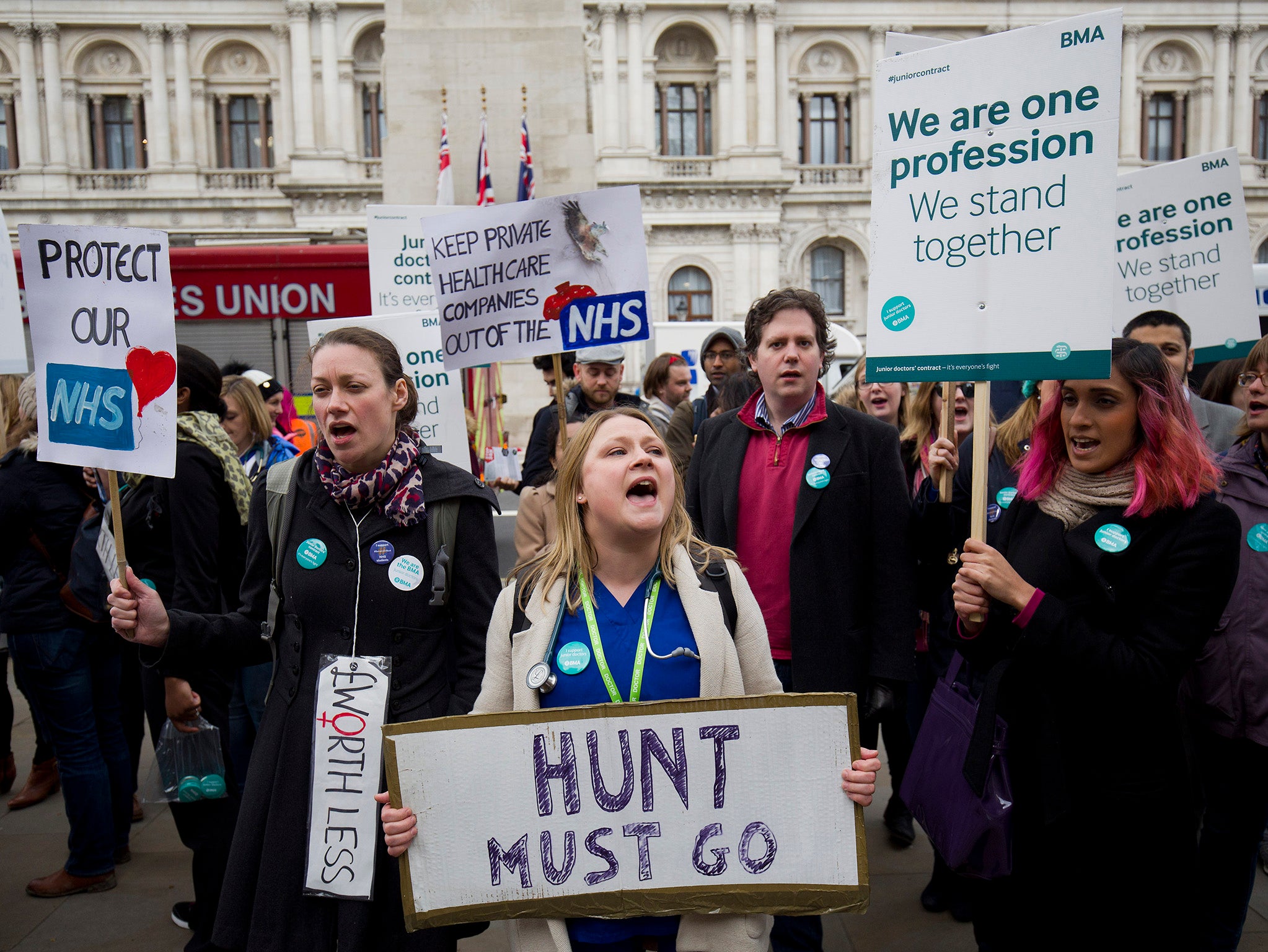Junior doctors begin first all-out strike in NHS history in row over 'seven-day service'
Junior doctors have been fighting for months against the planned imposition of a new contract for a 'seven day' NHS, which they say would endanger the service

Your support helps us to tell the story
From reproductive rights to climate change to Big Tech, The Independent is on the ground when the story is developing. Whether it's investigating the financials of Elon Musk's pro-Trump PAC or producing our latest documentary, 'The A Word', which shines a light on the American women fighting for reproductive rights, we know how important it is to parse out the facts from the messaging.
At such a critical moment in US history, we need reporters on the ground. Your donation allows us to keep sending journalists to speak to both sides of the story.
The Independent is trusted by Americans across the entire political spectrum. And unlike many other quality news outlets, we choose not to lock Americans out of our reporting and analysis with paywalls. We believe quality journalism should be available to everyone, paid for by those who can afford it.
Your support makes all the difference.Thousands of junior doctors have begun the first all-out strike in the history of the NHS after the Health Secretary said the Government would not be "blackmailed" into dropping its manifesto pledge for a seven-day health service.
Jeremy Hunt appealed directly to medics on Monday not to withdraw emergency cover, which he said had particular risks for A&E departments, maternity and intensive care.
The impasse between the Government and the British Medical Association (BMA) prompted the industrial action, from 8am to 5pm on Tuesday and again on Wednesday.
It is the first time services such as A&E, maternity and intensive care have been affected during the dispute over a new contract.
Speaking on BBC Breakfast, Mr Hunt accused union leaders of trying to "blackmail" the Government with strike action.
He said he could only call a halt to the action "by abandoning a manifesto promise that the British people voted on" at last year's general election.
The Health Secretary said: "It was the first page of our manifesto that we'd have a seven-day NHS.
"I don't think any union has the right to blackmail the Government, to force the Government to abandon a manifesto promise that the British people have voted on."
Despite an intense three days of letters back and forth and a phone call between Mr Hunt and the head of the BMA on Monday, no agreement on a way forward has been reached.
Mr Hunt said he was motivated by a desire to improve weekend services in the NHS and told MPs that "no trade union" had the right to veto a Government manifesto commitment to do so.
He said the disruption over the next two days is "unprecedented" but the NHS has made "exhaustive efforts" to ensure patient safety.
He said: "No trade union has the right to veto a manifesto promise voted for by the British people.
"We are proud of the NHS as one of our greatest institutions but we must turn that pride into actions and a seven-day service will help us turn the NHS into one of the highest quality healthcare systems in the world.
"I wish to appeal directly to all junior doctors not to withdraw emergency cover, which creates particular risks for A&Es, maternity units and intensive care units."
Mr Hunt said the NHS was "busting a gut to keep the public safe".
An Ipsos Mori poll for BBC News has found 57% support the doctors' cause while a quarter oppose it.
The majority still think the Government is most at fault for the dispute - but a rising number think the Government and doctors are equally to blame.
Public support for the all-out strike, where no emergency care is provided, appears to be higher than in January.
While 57% support the current walkout, the figure supporting a full strike was 44% at the start of the year, the survey of 861 adults showed.
More than 125,000 appointments and operations have been cancelled and will need to be rearranged across England's hospitals as a result of the latest dispute.
The BMA has defended the walkout, repeating its stance that it would have called off the strike if Mr Hunt agreed to lift his threat to impose the contract.
The head of the BMA, Mark Porter, told the BBC Radio 4 Today programme on Monday that the Government had "distorted" weekend death statistics, and stressed that emergency cover would be provided by consultants during the strike.
Responding to Mr Hunt's claim that lives were being put at risk by the strike, he added: "The Health Secretary is trying to find some way to throw mud at the junior doctors of this country who have been providing weekend and night emergency cover since the NHS started."
Earlier on Monday, more than a dozen presidents of royal colleges and faculties urged Prime Minister David Cameron to step in "at the 11th hour" to break the stalemate.
Labour leader Jeremy Corbyn said Mr Hunt should "back off ", adding: "We must stand up and defend the NHS."
He also asked if there was a "deeper agenda" to reduce the efficiency of the NHS while promoting private industry.
Join our commenting forum
Join thought-provoking conversations, follow other Independent readers and see their replies
Comments